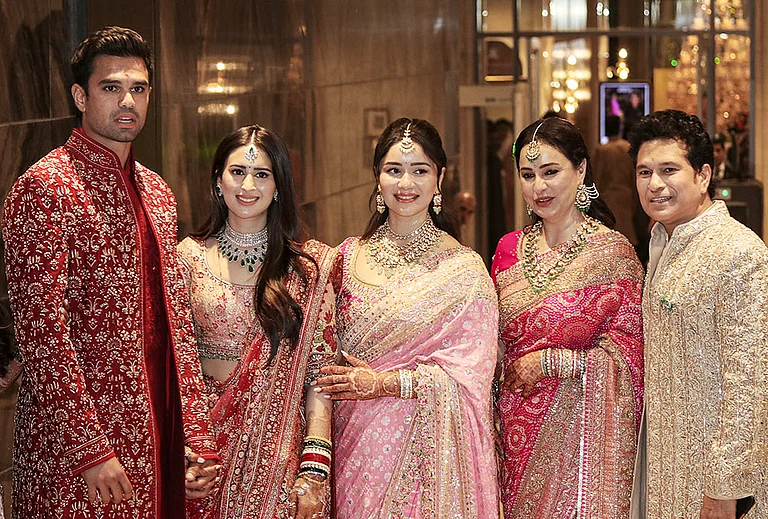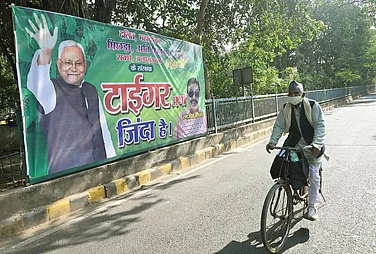It was in 1952 when the Indian Republic held its first Parliament session. At that time, within the halls of power and decision-making historically dominated by men, were 39 women parliamentarians too. It was the beginning of a movement that hoped to see women at the pinnacle of authority one day. More than 75 years later, in the recently concluded Parliament session, 78 women parliamentarians were seated in the House. However, a closer look at the discourse and communication used within the halls shows the absence of gender-neutral language. Why then would ministers still respond to women MP/MLAs’ questions with ‘Yes sir’.
Language has been one of the most powerful means through which sexism or gender stereotypes are reinforced within society. Salutations that include male pronouns such as ‘sir’ or ‘guys’ are often used to refer to both men and women. However, research has shown that such linguistic forms have the negative effects of making women disappear in mental representations. In the context of language used within the Parliament of India, which is the Supreme Legislative body of the country, references to women parliamentarians, including the first woman tribal President Droupadi Murmu, using male pronouns continues unabated.
Gender neutral language
In September 2022, Shiv Sena MP Priyanka Chaturvedi raised similar concerns in a letter addressed to Union Minister of Parliamentary Affairs Pralhad Joshi, saying that use of the phrase “no sir” in response to questions asked by women parliamentarians was “concerning”. Following the letter, the Rajya Sabha decided to use gender-neutral terms in responses to parliamentary questions from the next session onwards.
The reply from the Rajya Sabha secretariat, dated September 20, 2022, reads, “All proceedings of the House (including replies to Parliamentary questions) are addressed to the chairperson... However, ministries will be informed to furnish gender-neutral replies... from the next session of Rajya Sabha onwards."
However, the recently-concluded Parliament session, which witnessed an uproar over the violence in Manipur, a debate on no-confidence motion against the Narendra-Modi government and a statement by the PM hailing the government’s achievements, still lagged behind in inclusivity.
Parliament Monsoon Session 2023
While an approximate count of usage of male pronouns to refer to women parliamentarians could not be made, an overwhelming use of ‘yes sir’ was found in responses to questions asked by women leaders.
Two women MPs and two men MPs posed a question to the Minister of Home Affairs on cases of harassment against women in the country; whether there was an increase, how many accused have been convicted and whether the Government plans to constitute a committee to prevent the violence against women. The response to the last question (on formation of committee) which was given by Minister of State in MHA, Ajay Kumar Mishra, said, “Sir, at present, no such plan is under consideration.” Ironically, a question posed by two women leaders on women harassment was responded to using male pronouns.
In another instance, AITC MP Sajda Ahmed posed a question to the Minister of Home Affairs on auction of enemy properties; whether the government has initiated the auction, if there is a list of enemy properties that are to be auctioned etc. The response, yet again started with ‘Yes sir’.
Rajya Sabha member Darshana Singh posed a question to the Minister of Tourism, on whether the government is aware of the total number of tourists in the country, if so, the specific details of the number of tourists. To this, the Minister of Tourism G Kishan Reddy began the response with ‘Yes sir’.
According to a report by The Hindu in June 2022, references to inherently masculine pronouns are made over 150 times in the Rules of Procedure in Rajya Sabha and 600 times in the Constitution of India. In a compilation of ministerial replies to questions from the 17th Lok Sabha in that year, for 75 women Parliamentarians, it was found that 84% of the answers that used salutations (sir/madam) referred to women Parliamentarians as ‘sir’. During the 15th Lok Sabha, when we had a woman Speaker, only about 27% of the answers made this error.
‘Rashtrapati’ debate
In July 2022, Congress leader Adhir Ranjan Chowdhury referred to the President of India Draupadi Murmu as ‘Rashtrapatni’. The incident sparked a row, despite the Congress leader tendering a written apology, admitting that it was a slip of tongue.
However, it stirred up a debate on lack of gender-neutral terms to address the President. The President in India is called ‘Rashtrapati’ in Hindi. ‘Rashtra’ means nation and ‘Pati’ literally means husband. The issue was first raised when Pratibha Patil was elected as India’s first woman president in 2007. Some linguist experts had argued then that the word ‘pati’ in this context doesn’t literally mean husband, and is used to refer to a master or custodian. Social activist and human rights campaigner Shabnam Hashmi had then said, “Mantri also doesn’t reflect gender. But the moment you use ‘pati’ or ‘patni’, there are other connotations too.”
The debate fizzled away after Pratibha Patil’s term as two male presidents took over the office subsequently – Pranab Mukherjee and Ramnath Kovind. However, with President Murmu taking over the office, the term used to refer to the post needs a crucial debate once again.
Gender bias in language to gender bias in society
In her book Invisible Women: Data Bias in a World Designed for Men, Caroline Criado Perez writes that: “Seeing men as the human default is fundamental to the structure of human society.” She further explains that male bias is so firmly embedded in our psyche that even genuinely gender-neutral words [like doctor or actor] are read as male. How we speak affects how we think and how we interpret the world around us.
The gender biased terms or phrases used in the parliament often go beyond ‘sir’ and ‘madam’. For instance, last year, Bharatiya Janata Party (BJP) leader Chandrakant Patil told Nationalist Congress Party (NCP) MP Supriya Sule to “go home and cook” instead of being in politics, reiterating the long-existing patriarchal attitude and hierarchy of how politics is a profession only for ‘men’.
Women’s representation in the national parliament is a key factor to determine the extent of gender equality in parliamentary politics. In India however, women account for 14% representation in the Lok Sabha and 11% in the Rajya Sabha. Shouldn’t it be inexcusable, that in a country where women account for half of the population, they are still seen, spoken to and treated as inferior to that of their counterparts?






















